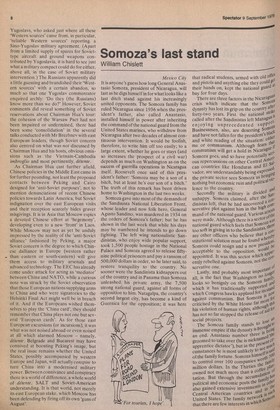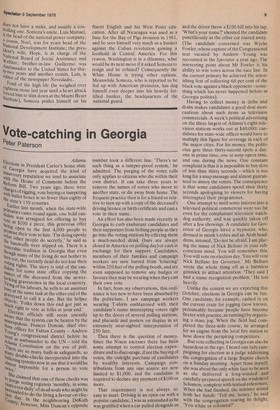Somoza's last stand
William Chislett
Mexico City It is anyone's guess how long General Anastasio Somoza, president of Nicaragua, will last as he digs himself in for what looks like a last ditch stand against his increasingly united opponents. The Somoza family has ruled Nicaragua since 1936 when the president's father, also called Anastasio, installed himself in power after inheriting the command of the national guard from the United States marines, who withdrew from Nicaragua after two decades of almost continuous intervention. It would be foolish, therefore, to write him off too easily; to a large extent, whether he goes or stays (and so increases the prospect of a civil war) depends as much on Washington as on the success of guerrilla operations in Nicaragua itself. Roosevelt once said of this president's father: 'Somoza may be a son of a bitch, but at least he's our son of a bitch.' The truth of this remark has been driven home to Washington in the last two weeks.
Somoza gave into most of the demands of the Sandinista National Liberation Front, whose leader and now folk hero, General Agusto Sandino, was murdered in 1934 on the orders of Somoza's father; but he has shown in the last week that while his days may be numbered he intends to go down fighting. The left wing nationalistic Sandinistas, who enjoy wide popular support, took 1,500 people hostage in the National Palace and Somoza agreed to release fiftynine political prisoners and pay a ransom of 500,000 dollars in order, so he later said, to restore tranquility to the country. No sooner were the Sandinista kidnappers out of the country and in Panama than Somoza unleashed his private army, the 7,500 strong national guard, against all forms of opposition to him. Natagalpa, the country's second largest city, has become a kind of Guernica for the opposition; it was here that radical students, armed with old rifles, and pistols and anything else they could go their hands on, kept the national guard at bay for four days. There are three factors in the Nicaraguan crisis which indicate that the Somoza dynasty has lost its grip on the country after forty-two years. First. the national siriNie, called after the Sandinistas left Managua enjoying unprecedented suPPar.; Businessmen, also, are deserting Soiri°43 and have not fallen for the president's blaci, and white reading of the situation: eiti/e;t me or communism. Although fears communism will get a hold in Nicaraguel. Somoza goes, and so have potentiallY seiT ous repercussions on other Central Arlicertili., can countries like Honduras and El vador, are understandably being expresse, the private sector sees Somoza as brir101.1' nothing but economic ruin and political v1°lence to the country. Secondly the military is divided ca/ind unhappy. Somoza claimed, after the '40: dinistas left, that he had uncovered servative plot against him in the high c°,0 mand of the national guard. Various arretile were made. Although there is a sector °f national guard which feels that SOflrC too soft in giving in to the Sandinistas, are other officers wilo believe that a cCiby stitutional solution must be found wherireefit, Somoza could resign and a new pre acceptable to the opposition, appointed. It was this sector which ftkit, ently rebelled against Somoza, not the e' servative one. _tit of Lastly, and probably most imPor' er all, is the fact that Washington no lolly. looks so benignly on the Somoza fliTiand which it has traditionally supporteu too which Congress hawks applaud against communism. But Somlro a e criticised by the White House far g irlorh this his violation of human h °lig d faf has not so far stopped the et prl etalueaa Isfteohoiftisa si f°: social projects. The Somoza family stands t° Iose t° 311 immense empire if the dynasty is Witco an end. Anastasio number three is colic groomed to take over (he is nicknarue cif' apprentice dictator'), but in the Presell,acb cumstances he is most unlikely to sees said of the family fortune. Somoza hiru5e1ftn1 500 to control over 100 companies 'Or faatilY million dollars. In the Thirties the owned not much more than a coffee.o of tation. But through the accumulatoriloas political and economic posts the faffi. l'the also gained extensive investmenis.,1" : die Central American countries ariu.!, is sad' United States. The family networ'coraoia that there are few interests in vvhich° does not have a stake, and usually a controlling one. Somoza's uncle, Luis Manuel, is the head of the national power company; a cousin, Noel, was for years head of the National Development Institute; the president's wife, Hope, is in charge of the National Board of Social Assistance and Welfare; brother-in-law Guillermo was Ambassador to the United States for thirtY-hvo years and another cousin, Luis, is editor of the newspaper Novedades. Fond of the high life (he weighed over eighteen stone last year until a heart attack forced him to slim down at the Miami Heart Institute), Somoza prides himself on his fluent English and his West Point education. After all Nicaragua was used as a base for the Bay of Pigs invasion in 1961, and he sees himself very much as a bunker against the Cuban revolution gaining a foothold in Central America. For this reason, Washington is in a dilemma; what would be its next move if it asked Somoza to resign and he refused? Consequently the White House is trying other options. Meanwhile Somoza, who is reported to be fed up with American pressures, has dug himself even deeper into his heavily fortified bunker, the headquarters of the national guard.



































 Previous page
Previous page